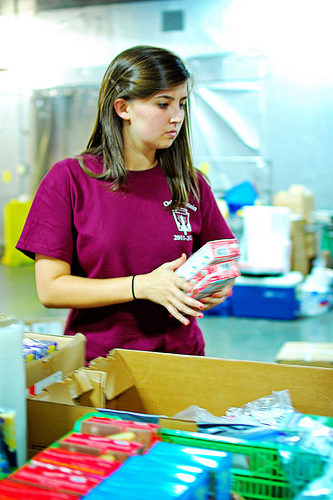Keep feeling the need for being first. But I want you to be the first in love, first in moral excellence, and first in generosity. – Martin Luther King Jr.

What can you do to serve others, to be first in love, moral excellence or generosity? This person is sorting relief supplies. Everyone can help, and everyone can be first rate!
What does that mean?
This is another Twitter friendly version of a quote. A more complete version of it is: “We all have the drum major instinct. We all want to be important, to surpass others, to achieve distinction, to lead the parade. … And the great issue of life is to harness the drum major instinct. It is a good instinct if you don’t distort it and pervert it. Don’t give it up. Keep feeling the need for being important. Keep feeling the need for being first. But I want you to be the first in love. I want you to be the first in moral excellence. I want you to be the first in generosity.” – Sermon at Ebenezer Baptist Church in Atlanta on February 2, 1968
This quote is about using our natural nature for the benefit of ourselves and of others. The quote says this instinct is both natural and important, and urges us not to give it up. It also warns us not to let it become distorted or perverted, as can easily happen to the self-centered.
Instead, the quote, a paraphrase of a biblical passage, we are urged to love one another, to be the best example of what people can become, and to be as generous as possible to others. We are urged to become the best at these things, so that we may become great in service, not in ego.
Why is service to others important?
Service to others has many benefits. The obvious one is the person being helped is now better off than they were before. But how do you feel after helping them? And, if you are like me, that good feeling lasts for a while, knowing that someone is doing better because of your efforts.
Depending on what you did, you may have touched on one or more of the three things specifically mentioned in today’s quote. Love is one of them, and in helping someone, you are saying that you love your fellow humans enough to take some time and effort to help them.
You probably are showing good moral character, perhaps even excellent, in providing assistance to someone in need. I am unfamiliar with any modern social system that considers helping someone to be morally wrong. And, of course, you are taking time, effort, money, and who knows what else to help them. How very generous of you.
In doing these things, we are following the quote, and are working hard at being first, being the drum major out in front of the parade, distinguished for what you have done. Even if you never tell anyone else, you will know, and, after the actual helping of the other person, that’s what it’s about.
Where can I apply this in my life?
Pretty much anywhere. Could you improve your moral excellence at work, by being even more ethical than you already are, or (even better) by helping others become more ethical? Could you help them understand when to say no to gifts, and when to report someone for trying to compromise your good morals?
In your social life, is there anything you could do to better love and serve your fellow humans? In different groups, it could mean different things. Depending on your strengths, it might be working Public Relations for an upcoming event, or handling the money at the door, or setting up tables. Even the idea for the event could be an act of love, if you’re raising money for a cause.
And don’t forget he day to day stuff in your social groups. There are plenty of jobs to do, mostly thankless but usually necessary, to keep things running smoothly. Newsletters, phone calls, finding locations or filling out forms, keeping the books, managing membership, the list is nearly endless. How can you show your love for your social friends?
Within your family, it is probably easy to be generous. But what about with complete strangers? Recently in the US, there were a series of tornadoes, including one in Moore, OK, which damaged or destroyed whole neighborhoods, and caused many deaths and hundreds of injuries.
So again I ask, how generous could you be to strangers? What disasters have occurred near where you live? Do you have a preferred charity which does good work in your area, or in an area in the world where there is much need and few resources? What about the sick and homeless in your town or city? How generous could you be to them?
In each of these scenarios, we have talked about trying to be first, about trying to be great, to lead, and to be important. For some, it might be the fame and glory of being seen doing something. For many others, however, the glory is in the knowing, and in the doing.
There is no shame in being first, if you are striving to do so for honest and positive reasons. And that is what the longer version of the quote urges us to do, and I would have to agree. Helping others, showing our love for them, being upright, and generous, that makes us first in service, and that is a good thing.
From: Twitter, @tonyrobbins via @DrMLKJrWisdom
confirmed at : http://blog.constitutioncenter.org/2013/04/10-famous-quotes-from-dr-martin-luther-king-jr/ entry #9, as well as at the link with the quote, which is a 9+ page typed document.
Photo by Jamie






